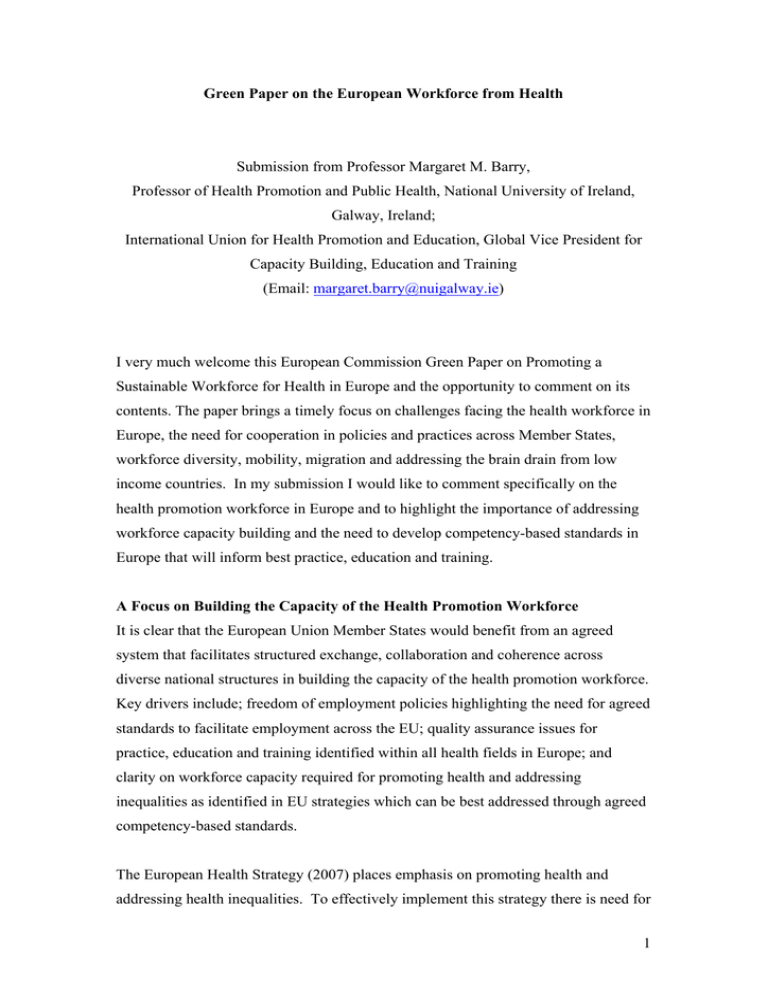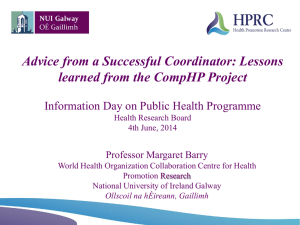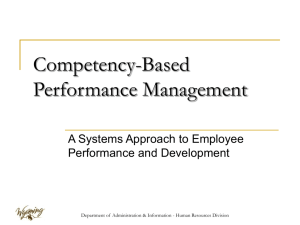Submission from Professor Margaret M. Barry,
advertisement

Green Paper on the European Workforce from Health Submission from Professor Margaret M. Barry, Professor of Health Promotion and Public Health, National University of Ireland, Galway, Ireland; International Union for Health Promotion and Education, Global Vice President for Capacity Building, Education and Training (Email: margaret.barry@nuigalway.ie) I very much welcome this European Commission Green Paper on Promoting a Sustainable Workforce for Health in Europe and the opportunity to comment on its contents. The paper brings a timely focus on challenges facing the health workforce in Europe, the need for cooperation in policies and practices across Member States, workforce diversity, mobility, migration and addressing the brain drain from low income countries. In my submission I would like to comment specifically on the health promotion workforce in Europe and to highlight the importance of addressing workforce capacity building and the need to develop competency-based standards in Europe that will inform best practice, education and training. A Focus on Building the Capacity of the Health Promotion Workforce It is clear that the European Union Member States would benefit from an agreed system that facilitates structured exchange, collaboration and coherence across diverse national structures in building the capacity of the health promotion workforce. Key drivers include; freedom of employment policies highlighting the need for agreed standards to facilitate employment across the EU; quality assurance issues for practice, education and training identified within all health fields in Europe; and clarity on workforce capacity required for promoting health and addressing inequalities as identified in EU strategies which can be best addressed through agreed competency-based standards. The European Health Strategy (2007) places emphasis on promoting health and addressing health inequalities. To effectively implement this strategy there is need for 1 a skilled health promotion workforce across Member States with shared understanding of the core principles, knowledge and evidence-base of health promotion, and the capacity to translate the strategy objectives into practice. Building and enhancing capacity to deliver effective health promotion is crucial to health improvement and the reduction of health inequities in Europe. Health promotion goals are clearly identified in EU strategies but there is no agreement on Europe-wide competencies, standards or accreditation systems to assure quality standards in reaching those goals. There is, therefore, a need for a coherent framework that will build on related national and international developments and lead to a comprehensive and flexible system for workforce development and quality assurance. It is recognised in EU policies and strategies that quality standards are key to the ethical use of resources and effective action on health. The training of staff based on clearly defined standards and the implementation of quality governance standards are seen as important mechanisms in achieving quality practice. The EU directives and decisions issued over the last two decades have sought to establish more flexible systems for recognising professional qualifications, and ensuring quality and access in health-related services, thus facilitating the principle of free movement across the European member state. The trans-national recognition of professional qualifications provides an impetus for developing common standards and quality criteria in the training and education of health professionals, and from a health promotion perspective all professionals with a health improvement remit. The international literature indicates that the identification of health promotion competencies, and the development of consensus around what constitutes core competencies, has an important role to play in informing health promotion training, professional development and accountable practice. The identification of core competencies to underpin quality training in European health promotion is an important area for further research and development. Development of Health Promotion Competencies and Professional Standards Health Promotion is an evolving field in Europe and with a diverse and growing workforce. The health promotion workforce is drawn from a broad range of disciplines, however, it is recognised that there is a specific body of skills, knowledge 2 and expertise that represent, and are distinctive to, health promotion practice. A number of quality focused initiatives have been developed in relation to health promotion in Europe. For example, the European Masters in Health Promotion (EUMAHP) consortium, established with European Commission funding, sought to improve the quality of health promotion through the professional training of health promoters in the EU. The development of a European core curriculum and professional competencies was central to their initial work. Competency models have been increasingly used globally since the 1980’s to clarify the specific requirements for public health, health education and health promotion practice. A number of countries have made significant progress in delineating competencies for health promotion (Battel-Kirk et al., 2008), including Canada, (Hyndman, 2007; Moloughney, 2006), Australia (James et al 2007; Shilton et al 2006, 2008; Howat et al, 2000), New Zealand (Health Promotion Forum for New Zealand 2000, 2004; McCracken and Rance, 2000) and a small number of countries in Europe (Morales and Barry 2007; De Castro Freire et al., 2007) e.g. the UK (PHRU, 2008; Health Scotland 2003, 2005; Skills for Health 2001, 2004), the Netherlands and Estonia (Morales et al., 2008). Significant developments have also taken place in the USA, mainly focusing on health education (Gilmore et al 2004, 2005). Accreditation systems have been developed in the USA (AAHE 1999; NCHEC, SOPHE, and AAHE, 2006), the UK (Skills for Health 2001, 2004) Estonia and the Netherlands (Morales et al, 2008). Some exploration of competencies has been undertaken in EU funded projects such as EUMAHP (Meresman 2003) and PHETICE (Public Health Education in the Context of an Enlarging Europe (http://www.phetice.org/). ASPHER (The Association of Schools of Public Health in the European Region – (http://www.aspher.org) is currently developing standards for public health practice which incorporate a health promotion competency sub-set. The Galway Consensus Conference Statement on Domains of Core Competencies in Health Promotion (Allegrante et al. in press) will also be useful in informing future work on the development of competency-based professional standards in Europe. This work will be taken forward at a practical level through the recently funded EAHC project on Developing Competencies and Professional Standards for Health Promotion Capacity Building in Europe (summary details attached in Appendix I). 3 European Developments lead by the International Union for Health Promotion and Education The need for standards and accreditation is identified as a strategic aim of the International Union for Health Promotion and Education (IUHPE 2007, 2007a). In 2005 the International Union for Health Promotion and Education European Committee (IUHPE EURO), formed a Sub-Committee with a remit to make recommendations on the development of health promotion training, accreditation and professionals standards in the European region. To date the Sub-Committee has undertaken a scoping study across the European region (Morales and Barry, 2007), and a pilot feasibility study on implementing a pan-European accreditation system (Battel-Kirk and Barry, 2008). The scoping study, which targeted 51 countries across the Euro-WHO region, found that health promotion training is undergoing development across Europe, albeit at differing rates of progress in different countries. Few examples of professional registration/accreditation systems were found and, in the few countries where they do exist, they are quite new e.g. in Estonia, the UK and the Netherlands. The study also highlighted the difficulty in accessing reliable data across Member States on workforce numbers, qualifications etc., a point also highlighted by the Green Paper. Based on the information acquired through the scoping study, a pilot feasibility study focusing on developing a pan-European accreditation system for health promotion was established by the Sub-Committee. The project comprised participants from seven countries. The framework proposes a devolved voluntary accreditation model operated centrally by IUHPE through national accrediting bodies approved by IUHPE. Intrinsic to the system is a Continuing Professional Development (CPD) programme as an ongoing quality assurance system. The feasibility project identified a high level of interest in the development of accreditation. However, it is clear that differences in health systems and health promotion structures must be taken into account when developing a shared accreditation system. The seven participating countries, together with 10 other partners from across the European region, formed a partnership to develop a proposal to the then Public Health Executive Agency in 2008 on establishing a pan-European accreditation system. The 4 proposal was successful in attracting funding over a three-year period commencing in September 2009. As co-ordinator of this project - COMPHP - (summary details attached for your information) we will be working in collaboration with all Members States through existing networks, notably the IUHPE, and linking to related European networks and international developments. The goal is to create a new dimension in European health promotion by establishing the means and methods by which quality governance standards can be implemented across Europe to stimulate further innovation and best practice. Submission Recommendations: • Building the capacity of the Health Promotion workforce be given greater focus and visibility in the development of the health workforce in Europe. As a relatively new multidisciplinary field of practice, there is a greater opportunity for cooperative practices across Member States and this work needs to be further supported. • Developing pan-European frameworks for agreeing core competencies and competency-based standards across the health workforce, and specifically in health promotion, be included as an area for further action in the Green Paper. • The role of the University sector and professional bodies in delivering high quality education and training of health specialists based on agreed competencies and standards, including Continuing Professional development, be given greater prominence in the areas for further action. • Proposed Code of Conduct in ethical recruitment and managing worker migration be developed with a view to also applying this to the ethical recruitment of students in all health disciplines in European Universities. • The collection of accurate data on the health workforce and their qualifications be supported at the European level. Professor Margaret Barry 31 March 2009 5 Appendix I Developing Competencies and Professional Standards for Health Promotion Capacity Building in Europe (COMPHP) PH Call 2008 – A/101187- COMPHP Project Summary The COMPHP project will develop competency-based standards for health promotion that will impact on workforce capacity to deliver public health improvement in Europe. Current and future health challenges demand new and changing competencies and skills which need to be identified in order to form the basis of best practice development, education and training. This initiative builds on the work of the IUHPE European region which, under the leadership of the Vice President for Capacity Building Education and Training, seeks to develop a pan-European competency framework for health promotion that will be coordinated by IUHPE. The development of a Europe-wide system of professional standards in health promotion will form the basis for building a competent and effective health promotion workforce capable of translating into action the key priorities identified in recent European health strategies and policies. A competent workforce is critical to addressing the current challenges of health inequities, promoting healthy ageing, healthy weight and positive mental health and wellbeing across Europe. The project builds on a Europewide scoping and feasibility study on implementing a competency-based accreditation system undertaken by IUHPE EURO. Working with the IUHPE European network and in partnership with key national agencies, this project will develop a consensus-based system in collaboration with practitioners, policymakers and education providers from across the geographical spread in Europe. Bringing together partners with experience across the professional development, policy, practice and academic sectors, the project will develop, test and refine the implementation of a sustainable competency-based system in 6 countries with varying levels of infrastructure development (from developed to virtually non-existent).A set of core competencies, professional standards and a coordinated quality assurance accreditation system for health promotion will be developed and disseminated AIM and OBJECTIVES Aim: To develop competency-based standards and an accreditation system for health promotion practice, education and training that will positively impact on the workforce capacity to deliver public health improvement in Europe. Objectives 1. To identify, agree and publish core competencies for health promotion practice, education and training in Europe. 2. To develop and publish competency-based professional standards for health promotion practice. 3. To promote quality assurance through the development of a Europe-wide accreditation system. 4. To map competencies and standards in academic courses across Europe and link to accreditation for academic settings. 5. To pilot competencies, standards and accreditation with practitioners in a range of settings across Europe. 6. To engage in consultation with key stakeholders and disseminate information on the project outcomes throughout the 27 member states and all candidate states. EXPECTED RESULTS The implementation of the specific objectives will provide the following outcomes: 1. A shared understanding of, and consensus on, the core competencies required for health promotion practice, education and training in Europe. 2. A set of competency-based standards that will inform capacity building for professional practice in health promotion across Europe. 7 3. A centrally validated accreditation system managed by IUHPE EURO, which will empower national/regional bodies to accredit individuals and education and training providers using agreed criteria. 4. Enhanced education and training programmes in health promotion across Europe based on a shared understanding of the core competencies and standards that need to be incorporated into academic core curricula. 5. The promotion of workforce development and best practice in health promotion through engaging practitioners and professional bodies in the development of quality standards and accreditation systems. 6. Greater cooperation and coordination in health promotion practice, education and training across Europe, will be promoted by an active project consultation and dissemination process, leading to improved quality of practice based on agreed competencies and standards. The COMPHP project commences on 1st September 2009 and will run for three years. Further information is available on request from the project coordinator Professor Margaret Barry (margaret.barry@nuigalway.ie). 8 This paper represents the views of its author on the subject. These views have not been adopted or in any way approved by the Commission and should not be relied upon as a statement of the Commission's or Health & Consumers DG's views. The European Commission does not guarantee the accuracy of the data included in this paper, nor does it accept responsibility for any use made thereof.





